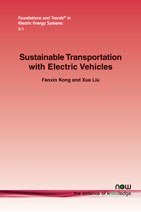Sustainable Transportation with Electric Vehicles
By Fanxin Kong, University of Pennsylvania, USA, fanxink@seas.upenn.edu | Xue Liu, McGill University, Canada, xueliu@cs.mcgill.ca
Abstract
Electric vehicles are gaining more and more popularity due to low oil dependency and low emission. Their deep penetration will significantly benefit the environment, but meanwhile will cause two crucial consequences. First, electric vehicles introduce heavy load impact into the power grid by shifting energy demand from gasoline to electricity. The surging load will compromise the grid’s reliability and jeopardize its power supply quality. Second, charging stations become indispensable infrastructure to support large deployment of electric vehicles. The availability in public destinations comes with electric vehicles competing for both power supply and service points of charging stations. The competition degrades quality of service and thus can compromise the original intent of advocating electric vehicles. There are many research efforts addressing either of the two consequences above. Different with them, we consider both and jointly study quality of service for electric vehicle users and reliability of the power grid. We review recent developments on this topic in this article. In Chapter 1, we introduce the ecosystem of electric vehicles and discuss motivations for managing charging load. This chapter further presents a systematic solution framework for smart electric vehicle charging. The following chapters then study each block of the framework. Specially, in Chapter 2, we investigate charging rate control, which handles how to allocate power supply to electric vehicles within a charging station. In Chapter 3, we address electric vehicle demand response, which is how to make electric vehicles follow the power supply of charging stations and the power grid. In Chapter 4, we study electric vehicle scheduling, which copes with how to schedule electric vehicles to multiple charging points within a charging station. In Chapter 5, we discuss charging demand balancing, which deals with how to balance electric vehicles among multiple charging stations. In these chapters, we first present deployable algorithms and mechanisms that are designed for each framework blocks. Then, we evaluate the proposed approaches by two complementary ways. One way is leveraging theoretical analysis to demonstrate their performance guarantees, while the other is using extensive simulations based on realistic data traces and simulation tools. We also review studies that align with the corresponding framework blocks and consider additional dimensions and/or different optimization goals. Finally, in Chapter 6, we conclude the article with summaries of main ideas discussed in the previous chapters.
Sustainable Transportation with Electric Vehicles
While electric vehicles (EVs) are becoming increasingly popular. Their low oil dependency and low emissions will significantly benefit the environment. However, as demand increases for EVs, their prevalence will also lead to two crucial consequences. First, electric vehicles introduce a heavy load impact onto the power grid by shifting energy demand from gasoline to electricity. The surging load is likely to compromise the grid’s reliability and jeopardize its power supply quality. Second, charging stations become indispensable infrastructure to support widescale deployment of EVs. EVs will therefore find themselves competing for both power supply and charging stations. Such competition can degrade quality of service and thus compromise the original intent of advocating electric vehicles.
Sustainable Transportation with Electric Vehicles investigates smart electric vehicle charging. It focuses jointly on the quality of service for EV users and the stability and reliability of the power grid. It lays out a solution framework that addresses many of the key problems arising from both the lower and upper levels. The proposed solutions are developed mainly using techniques from the optimization, game theory, algorithmic, and scheduling fields.
